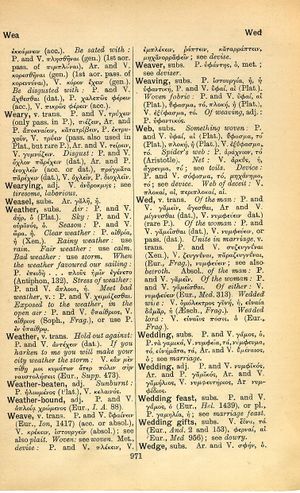wed
From LSJ
τὸ δὲ ποιεῖν ἄνευ νοῦ ἃ δοκεῖ καὶ σὺ ὁμολογεῖς κακὸν εἶναι: ἢ οὔ → but doing what one thinks fit without intelligence is—as you yourself admit, do you not?—an evil
English > Greek (Woodhouse)
v. trans.
Of the man: P. and V. γαμεῖν, ἄγεσθαι, Ar. and V. μίγνυσθαι (dat.), V. νυμφεύειν dat.) (rare P.).
Of the woman: P. and V. γαμεῖσθαι (dat.), V. νυμφεύειν, or. pass. (dat.).
Unite in marriage, v. trans. P. and V. συζευγνύναι (Xen.), V. ζευγνύναι, παραζευγνύναι, (Eur., Frag.), νυμφεύειν; see also betroth.
Absol., of the man: P. and V. γαμεῖν.
Of the woman: P. and V. γαμεῖσθαι.
Of either: V. νυμφεύειν (Eur., Med. 313).
Wedded wife: V. ὁμόλεκτρος γυνή, ἡ, εὐναία δάμαρ, ἡ (Aesch., Frag.).

